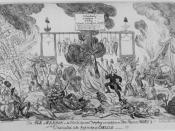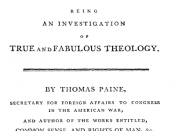Modern Romanticism is a literary and artistic movement of the eighteenth and nineteenth centuries that placed value on emotion over reason, on the imagination over society. Some sources say Romanticism started in reaction to neo-classicism (or the Enlightenment). Neo-Classicism's duration was until around 1800, which directly precedes the popularization of Romanticism. The focus of Neo-Classicism is essentially reason, balance, clarity, and tradition; the most important result of romanticism was the emphasis laid upon the feeling, passion, nature, and originality.
The Neo-Classicist portrayed man as being imperfect and sinful; they were convinced that human reason could discover the natural laws of the universe and determine the natural rights of mankind; thereby unending progress in knowledge, technical achievement, and realizing moral values. Imagination was usurped by common sense and philosophical conservatism. Revolutionaries such as Thomas Paine, John Locke, and Thomas Jefferson, among others, are the embodiment of Neo-Classic writers. Most of the works of these influential figures were nonfiction, written to instruct, to enlighten, and to make people think.
These people believed reason shows life as it is; whereas, the imagination shows life as people wish it were or fear it may be. Another concept emerging from the Age of Reason, or Neo-Classicism, was humanistic concerns, the idea that people who are more fortunate should assist those who are less fortunate was. Prior to the Neo-Classicism, religious beliefs perceived assistance to the unfortunate as interference with God because people thought if someone were unfortunate, it was God's will and was punishment for wrongdoing.
Believed as a direct outcome of Neo-Classicism, Romanticism emerged as the divergent predecessor to the Age of Reason. The aspect most stressed is the freeing of the artist and writer from the restraints and rules of the classicists and suggesting that phase of individualism marked by the encouragement of...



It's ok....
This essay is ok, but you really need to work on your clarity of topic. I know it's boring, but focus on outlining before you start writing. One thing that helps me is to write each individual topic on notecards, that way I can reorganize the topics at will.
1 out of 1 people found this comment useful.